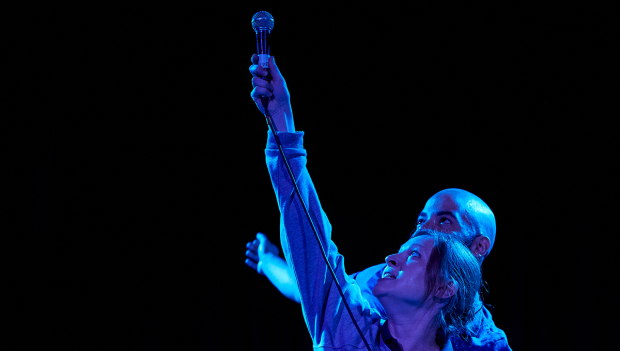Edinburgh review: Heather (Summerhall)
Thomas Eccleshare’s theatrical triptych sees a children’s author caught in controversy

Heather Eames is about to become a literary sensation. She’s created the next Harry Potter – Greta, a girl battling evil with a magic pen. As the world’s press presses in, the reclusive writer is struggling to maintain her own privacy. A mother of two, battling a serious illness, she hasn’t even met the person who’s steered her to success, her publisher Harry.
Thomas Eccleshare’s nifty theatrical triptych finds inspiration in the public profile of J.K. Rowling and the unwarranted unmasking of Elena Ferrante. In short, without giving too much away, Greta isn’t the only fictional creation here – and there are very, very good reasons for that.
It’s one helluva twist when it arrives, and Eccleshare raises some big aesthetic conundrums with a really light touch. Heather asks whether we can ever separate a piece of art from the artist behind it, both in its creation and in its consumption. As the publishing world drops Greta and distances itself from both Heather and Harry, the play asks whether certain demographics have a monopoly on mainstream culture, and whether we look to art to confirm or overturn our expectations. In the background there are a whole load of questions about representation and rehabilitation.
In that sense, it’s a play about words and deeds – and the way every pen really can work magic. Eccleshare splits the story into three acts: an email chain first, a face-to-face meeting then a flight of fancy. It’s a structure that moves from the plain written word to stage naturalism to an imaginative space where anything goes, and Eccleshare toys with the rules of representation throughout. There’s politics in that: the idea that anyone should be able to represent anything. If we can credit wizarding schools and fantasy forests, we can surely stretch to that.
Ironically, then, it’s the writing that lets Heather down. For all the substance of its central conceit, too much of the text simply isn’t credible. Harry and Heather’s emails ring false, both as a portrait of publishing and just as emails, and while their face-to-face meeting crackles with tension as Ashley Gerlach and Charlotte Melia size each other up, it’s not always psychologically credible. By the time we meet Greta herself, she feels like a cheap knock-off; a passable impression of children’s literature, not the real deal.
Perhaps that’s the point – a way to show how easy it is, and so how much success hinges on identity and branding. Eccleshare acknowledges that such strategies reduce people, portraying children’s writers as straightforward saints: Jacqueline Wilson, Joanna Rowling, Lauren Child – all white, all women, all mothers and all of them success stories. That’s the thing about stories though. They’re simplifications.
Heather runs at Summerhall until 27 August. It then tours the UK before a run at the Bush Theatre in London.
Check out all of our Edinburgh Fringe coverage here















